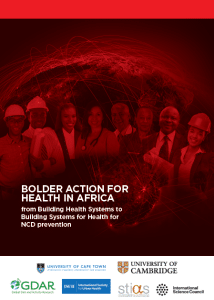“To prevent non-communicable diseases (NCDs) we need to build systems for health not just health systems,” said Tolu Oni, Public Health Physician and Clinical Senior Research Associate at the Medical Research Council Epidemiology Unit, University of Cambridge; Honorary Associate Professor, School of Public Health and Family Medicine, University of Cape Town; STIAS Iso Lomso fellow and Next Einstein Forum Fellow.
Oni and her colleagues: Ebele Mogo of McGill University; Aliko Ahmed of the Cambridge Institute of Public Health; Charles Ebikeme of the Urban Health and Wellbeing Programme, International Science Council; Yonette Thomas, of the International Society for Urban Health; Amy Weimann of the School of Public Health and Family Medicine, University of Cape Town; and, Justine Davies of the University of Birmingham and STIAS visiting scholar, issued a challenge to governments in a policy brief conceptualised during her and Davies’ residencies at STIAS.
The key points include:
- African countries are not on track to achieve their NCD prevention and management targets.
- Risk factors for NCDs are driven by complex ecological drivers outside of the healthcare sector including poor urban development, poverty, socio-cultural factors, and the proliferation of unhealthy food environments, tobacco and alcohol.
- The focus of Universal Health Coverage on healthcare service provision is insufficient in itself to achieve health and wellbeing in Africa.
- To turn the tide of this emerging NCD epidemic in Africa, a re-think is needed towards a systems-for-health approach, from reactive provision of health services to proactive health creation and prevention.
- This approach incorporates housing, planning, waste management, education, governance, and finance, amongst others; in strategies to improve health.
- Investments should be made in strengthening the systems that can be harnessed to produce health, and in aligning the governance and strategic objectives of all health determinant sectors for health creation.
The group pointed out that preventing and managing NCDs make sense from an economic point of view but, to date, policy responses in Africa have been fragmented and vertical. They believe an expanded focus on proactive health creation will facilitate long-term cost saving.
“We must have integrated systems including but not limited to the health sector,” said the authors. “The conceptualisation of health services must be expanded to incorporate all the sectors that influence health outcomes. This should be reflected in policy making, accountability mechanisms, government departments and ministries, financing structures that encourage multi-sectoral action, an integrated approach to producing health, and the leveraging of benefits across sectors.”
The brief makes urgent recommendations to policy makers and the research community. These include the integration of systems, increased collaboration and knowledge sharing, rethinking health financing, and focusing on health creation as central to development.
Oni’s STIAS fellowship is centred around her ongoing work on the challenges in understanding the health impact of housing policies on infectious and non-communicable diseases. She is also involved in the STIAS long-term theme Health in Transition.
Click on the link or the image to download the full policy brief: [download id=”10595″]

